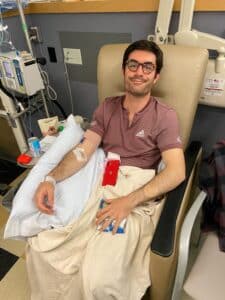Pediatric Melanoma Awareness – Austin and Kayla Damiani

Guest blog from Austin and his wife and caregiver Kayla Damiani describing their journey through diagnosis and treatment as he currently battles with Stage 4 Metastatic Melanoma:

In February 2020, my husband Austin was first diagnosed with Stage 2 Melanoma at 29 years old, about a month before our wedding. It had been several years since he had gotten a skin check and there was a mole on his forearm that he noticed had been changing in appearance. After a quickly scheduled surgery and a clear sentinel lymph node biopsy, he was back to being cancer free with a small crater left in his arm as a gentle reminder to wear sunscreen, cover up and get his regular skin checks. With all the wedding prep chaos, I really don’t think we had the time or mental capacity to comprehend that Austin was a cancer survivor.
Fast forward through the wedding, COVID, buying a house and having a baby girl, to April 2023. Austin was diagnosed with Stage 4 Melanoma after having 2 lumps biopsied by his dermatologist. He had been diligent about getting regular skin checks, but unfortunately these lumps ended up being lymph nodes and before we knew it we were looking at a PET scan that showed a tumor in his lung. We honestly hadn’t given much thought to the prospect of his cancer returning, as his prior stint seemed to end as soon as it began. Nothing can prepare you for hearing a loved one has advanced stage cancer, but the fact that Austin was so young and we had just settled into this new chapter of our lives just made it all the more crushing.
Next, we immediately started immunotherapy. Austin had two doses of Yervoy/Opdivo with great results, but ultimately it caused hepatitis so we had to stop and let him recover from that. We then tried Opdivo alone, but it caused colitis and hepatitis. Together with Austin’s Oncologist at UCSD, in January 2024 we decided we would take a break from immunotherapy since Austin’s tumor had remained stable for a number of months despite the intolerances and inconsistent infusions. The plan was to get periodic scans to keep an eye on things and continue the conversation around what the next move was going to be.
Austin and I, along with his dad, decided to take the opportunity to go to Washington D.C. in February to attend the MRA Patient Forum. We thought it would be an amazing opportunity to meet other patients, caregivers and oncologists, learn more about this disease and just take a trip while Austin was feeling well. Melanoma had seemed to start touching every part of my life at this point, as my brother was diagnosed with Stage 1A Melanoma in August 2023 which has added a new layer of concern for my daughter as well. TIL therapy had been approved by the FDA right before the conference so it was definitely the hot topic; little did we know that was the option we didn’t know we needed.
While we were in D.C. Austin felt a hard lump in his abdomen. When we got home, tests showed that the cancer had spread to his GI tract and his brain. It had been almost a year since Austin’s Stage 4 diagnosis and it was devastating to feel like everything Austin had been through up until that point felt like it was for nothing. Cancer is cruel like that I suppose. After one round of brain radiation, he is now on BRAF/MEKi targeted therapy and waiting for that to run its course, at which time we will proceed with TIL therapy.
Austin’s journey has felt like a long one, and I’m not sure I see the light at the end of the tunnel just yet, but I am profoundly grateful for the researchers, oncologists, melanoma warriors, caregivers and organizations like the MRF for giving me hope that we can beat this disease.
Austin’s experience has underscored a crucial truth: patients need options. There isn’t a one-size-fits-all approach, and Austin has been lucky to have access to a range of treatments due to his otherwise good health prior to diagnosis. The importance of spreading awareness about skin cancer and its prevention cannot be overstated. Early detection and prevention are game-changers, and I hope our story highlights the critical need for regular skin checks and sun safety. By sharing our experiences, pushing for better treatments, and supporting each other, we can make a significant impact and improve outcomes for everyone affected by melanoma.
To all of the melanoma warriors and caregivers out there – I see you. I see the strength you muster every day, the resilience you show in the face of challenges, and the unwavering support you offer to your loved ones. Whether you’re undergoing treatment, managing side effects, or supporting someone through their fight, your dedication and perseverance are nothing short of extraordinary.



